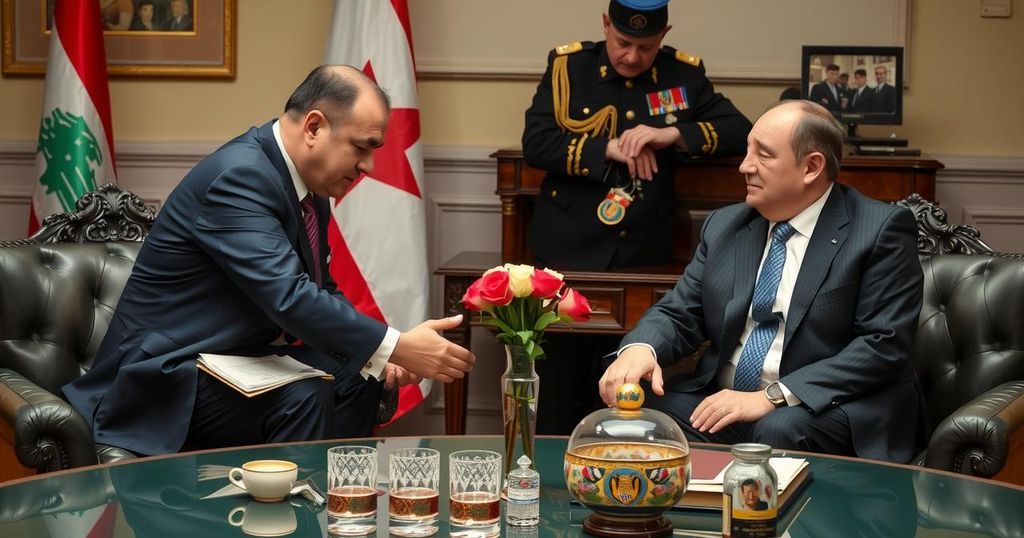Caretaker Lebanese Prime Minister Najib Mikati is set to meet Syrian leader Ahmed al-Sharaa in Damascus, marking the first visit by a Lebanese premier in 15 years. The meeting signals a potential thaw in relations between the two countries, historically marked by conflict and tension, particularly following Syria’s long military presence in Lebanon that ended in 2005.
Lebanon’s caretaker Prime Minister Najib Mikati is scheduled to meet with Syria’s de facto leader, Ahmed al-Sharaa, in Damascus on Saturday. This meeting marks a significant diplomatic event, as it represents the first visit by a Lebanese Prime Minister to the Syrian capital since the regime of Bashar al-Assad fell. It is noteworthy that this visit will be the first by a Lebanese premier in fifteen years.
Lebanese President Joseph Aoun emphasized prior to this meeting the potential for “a serious and equal dialogue” with Syria, a nation that historically wielded considerable influence over Lebanon, particularly during the Assad family’s prolonged rule. This influence included the presence of Syrian troops in Lebanon for nearly three decades until 2005, an occupation that faced substantial opposition from segments of the Lebanese population.
During a recent dialogue with Lebanese Druze politician Walid Jumblatt, Sharaa assured that Syria would refrain from meddling in Lebanon’s domestic matters, a pledge aimed at easing tensions in a region often marked by strife. Mikati’s visit was initiated by a phone invitation from Sharaa. Lebanese Foreign Minister Abdallah Bou Habib is anticipated to accompany the Prime Minister, reinforcing Lebanon’s goal of fostering amicable relations with its neighbor.
Historically, the dynamics between Lebanon and Syria have been contentious since both nations gained independence in the mid-20th century. Hezbollah, an Iranian-aligned Shia group in Lebanon, played a crucial role in supporting Assad during the Syrian civil war, actively combating insurgent forces. Furthermore, Syria’s past involvement in Lebanon’s civil war has continuously influenced their bilateral relations.
The assassination of former Lebanese Prime Minister Rafik al-Hariri in 2005 has left a lasting impact on Lebanese-Syrian relations, triggering large-scale protests in Lebanon alongside international condemnation that eventually forced Syria to withdraw its troops. This incident initiated a series of investigations implicating high-ranking Syrian and Lebanese officials, leading to the eventual conviction of three Hezbollah members by a U.N.-backed court, an assertion the group consistently denies.
This pivotal meeting between Mikati and Sharaa may represent a critical juncture in Lebanese-Syrian relations, potentially allowing for renewed dialogue and understanding between the two nations. Expectations remain high amid hopes for an amicable resolution to past grievances and concerns.
The backdrop of the forthcoming meeting between Prime Minister Najib Mikati and Syria’s Ahmed al-Sharaa is rooted in a complex history of Lebanese-Syrian relations. After decades of Syrian military presence in Lebanon that ended in 2005, ties have been characterized by distrust and geopolitical maneuvering. The recent political shifts in both countries provide a context for this meeting, which is seen as an opportunity for dialogue after years of tension.
In conclusion, Prime Minister Najib Mikati’s impending visit to Damascus is a notable development in Lebanese-Syrian relations, marking the first meeting of its kind in over a decade. As both leaders engage in discussions, the potential for renewed diplomatic dialogue offers a chance to address historical grievances and foster cooperative relations moving forward. The eyes of the region watch closely, as this meeting could reshape the dynamics between the two nations.
Original Source: www.newarab.com






